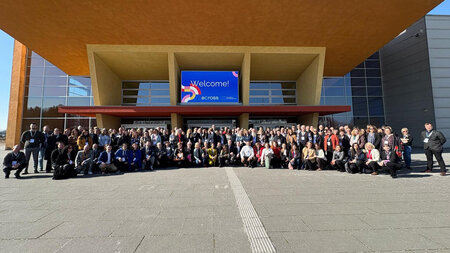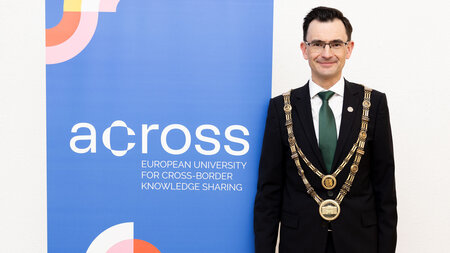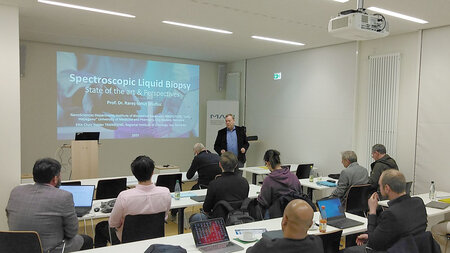A Year of Working, Teaching, and Learning Remotely
How Chemnitz University of Technology nearly effortlessly changed from in-person to remote operations – a look back
On March 22, 2020, the first “lockdown” took effect in Germany with wide-reaching consequences for both public and private life – also at universities. Immediately urgent, aside from infection control, were also quickly building and swiftly implementing structures and formats so both students and employees could work remotely. “Chemnitz University of Technology reacted immediately and quickly transitioned to remote operations with digital solutions for teaching, learning, examinations, and university-wide mobile work,” says Prof. Dr. Maximilian Eibel, Vice President for Academic and International Affairs.
Many factors made this possible. Already existing structures in Saxony could be bundled together with new and expanded offerings from the e-learning team and made available to the entire university. The team consists of workers from the University Computer Center, university didactics, and the “Hochschuldidaktisches Zentrum Sachsen” (Digital Higher Education Saxony) at Chemnitz University of Technology, which is funded by the Saxon State Ministry of Science, Culture and Tourism (SMWK). In addition, Chemnitz University of Technology was able to build on already existing infrastructure for digital teaching and working.
An additional challenge for the almost seamless transition to remote operations was the continual, transparent, and resilient communication from the university’s crisis management team in the form of the president’s newsletter and the president’s open letters (https://www.tu-chemnitz.de/tu/pressestelle/aktuell/10050/en).
“Digital examinations were and will be scientifically supported and evaluated in order to create a fundamental basis for improvements and further developments,” explains Eibl. The project is led by Ulrike Rada, a university didactician, and Dr. Sascha Schneider, a research assistant at the Department of Psychology of Learning with Digital Media (Director: Prof. Dr. Günter Daniel Rey). The scientific support includes surveys of students after the end of the examination. In addition, group interviews were conducted with the examiners after the examination and the examination process was observed. In addition, a university-wide survey of students and examiners was conducted during the 2020 summer semester and the 2020/2021 winter semester.
Another advantage was the digitization already initiated at Chemnitz University of Technology on many levels, including the university-wide "Tag der digitalen Hochschulbildung” (Digital Higher Education Days) held in January 2020. The goal here was to discuss the formation of a university-wide digitization strategy. "So the pandemic merely accelerated the digital development at Chemnitz University of Technology in many areas," Eibl summarizes.
Along with the technical possibilities, programs were offered by the e-learning team that support employees, teachers, and learners. In addition to numerous training sessions on teaching and exams, the team offered open office hours and a hotline to clarify questions about existing scenarios in a direct exchange.
By the 2020 summer semester, well over 700 courses were available digitally and the essential structures for the widespread use of video conferencing were in place. By the 2020/21 winter semester, Chemnitz University of Technology was able to offer the majority of its exams completely digitally. Close monitoring of the digital exams, including a support hotline run by the e-learning team, supplemented the offerings. Students were also able to borrow laptops and technology to take online exams as needed. In addition, under certain conditions, access to the university library was available as a workstation for exams and theses.
One sign of the successful transition from analog to remote operations at Chemnitz University of Technology, especially in the area of learning and teaching, is the awarding of the "Hochschulperle Spezial" (Special University Pearl) by the Stifterverband für die Deutsche Wissenschaft for the "TU4U - SelfE"program that offered with customized online support services for students. However, this is also particularly demonstrated by the many positive reactions from students and teachers, including via the university's social media channels.
Established digital portfolio
The fact that the switch to remote operations could be completed almost seamlessly is due, on the one hand, to an already established and resilient technical infrastructure with corresponding systems. This includes, in addition to a flexible and powerful server infrastructure, the ability to securely connect to the campus network via VPN, remote access to workstations, accessibility by telephone, the use of the in-house TUCcloud for data exchange, experience and expertise in the use of video conferencing systems, and assistance in the form of proven support channels. In addition, the joint Saxon video platform "Videocampus Sachsen" was nearly completed and ready for cross-university use by the start of the summer semester 2020. The "Videocampus" can be used by lecturers to provide students with lecture recordings or accompanying video material.
On the other hand, the e-learning team was able to bundle the existing but previously separate technical and didactic competencies. This made it possible to offer professional continuing education and training in-house.
Privacy-compliant and resilient videoconferencing and exam platforms selected
A major challenge in the transition to remote operations was the rapid establishment of reliable video conferencing solutions. Of key importance here, in addition to data protection, was scalability for a rapidly growing number of participants. Previous videoconferencing solutions such as WebEx, AdobeConnect or DFNConf were not suitable, as they collapsed under the increased number of accesses nationwide. Thus, various solutions were examined by the URZ. Due to a focus on online teaching, good scalability, and data protection regulations, the choice fell on the open source solution BigBlueButton (BBB). Within a week, the URZ had set up the first test servers at the end of March 2020. Already in this phase, the team offered training courses for use in teaching with over 150 participants. Parallel to the test system, the productive system was also created. This went online after another week. A short time later, teachers at Chemnitz University of Technology were already reporting their experiences and posting positive reactions on social media. This meant that both students and teachers had the option of creating and managing their own video conference rooms.
In the meantime, the BBB system at Chemnitz University of Technology has been expanded to twelve servers, securing the operation. "Because BBB is an open source project, it was easy to adapt it to our needs, so that, for example, logging in can be done directly via a university account," reports Daniel Schreiber from the URZ. Schreiber adds: "Due to the larger number of participants, video conferences at universities have completely different requirements than systems for schools, for example. Since we are in regular and direct contact with the BBB development team, we were the first university in Germany to implement improvements that allow larger conferences with several hundred participants. That this works was demonstrated at the Chemnitz Linux Days in March, with up to 500 participants per conference room."
Online exams successfully digitized - "TUCexam" platform established
The learning platform OPAL with the integrated test suite ONYX, which was already used in teaching, was chosen as the platform for conducting online exams. Since OPAL is also used at other universities and performance bottlenecks in the execution of examinations could not be ruled out as a result, the independent examination platform TUCexam, which is based on OPAL/ONYX, was developed especially for examinations at Chemnitz University of Technology.
This platform enables the organization of the participants, simultaneous release of the exam, and the completion of exams as well as the secure storage of the student results after the examination. In the run-up to this, there were also additional training courses for those responsible for examinations in order to accompany the work with the new system as well as the redesign of the examination contents towards a competence-oriented examination: "We accompanied the examiners intensively during the complete changeover from analog to digital examinations. This involved, for example, the development of valid examination tasks and formats such as open-book examinations," says university didactician Ulrike Rada. "The demand for individual consultations was never as high as during this time and was also made possible by the e-learning team via the hotline, the ticket system and personal discussions," adds Antje Schreiber from the URZ. Both are members of the e-learning team.
Well-prepared for the exam period
In preparation for the 2020/2021 winter semester’s examination period, a two-day examination workshop offered teachers a final opportunity to obtain comprehensive information, exchange ideas, and make final preparations. In addition to workshops on the use of the examination platform and the discussion of didactic scenarios, examiners from the summer semester presented their experiences - success stories as well as pitfalls. During the exams, a hotline installed specifically for this phase was also available to the teachers. This offer was gratefully accepted, according to Yvonne Seidel from the URZ and member of the e-learning team. As a result of the good preparations, ad hoc help was needed less frequently than expected in advance.
Additional information on "E-Learning - Use in Teaching": https://www.tu-chemnitz.de/e-learning
(Source: Chemnitz University of Technology E-Learning Team / Translation: Chelsea Burris)
Matthias Fejes
12.04.2021






